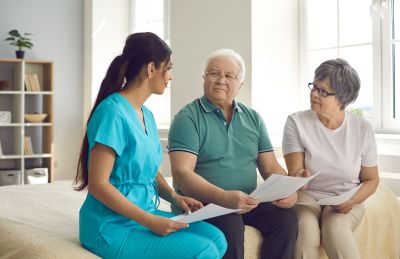Download or print
Request accessible format of this publication.

During your time in hospital, your healthcare team will discuss a date for you to return home. Before you leave, we will provide you with information you may need to continue your care at home.
This includes:
Our staff might refer to this process as ‘discharge’.
Our physiotherapists, occupational therapists and social workers can assess what you need to return home safely. This could include driving restrictions; help for walking or equipment you may need to manage at home. They may talk to you about other services that could help you once you are home. Check that any of your pre-hospital support services will start again after going home from hospital.
If you need to be transferred to another hospital or a residential care home to continue your recovery and care, we will discuss this with you and your family. Transport home by ambulance is only available if medically needed. You will need to make your own arrangements for your return home. If you have any issues organising transport you can discuss this with your healthcare team.
Most patients who are discharged from our hospitals will receive a follow-up phone call within 2 days after leaving hospital. We will check how you are feeling, if you understood and are following your discharge instructions, and whether you are taking your prescribed medications correctly. It is a chance for you to ask questions, confirm information you are unsure of and to provide feedback regarding the care you received.
Find out more about what to do when you are back home and what to look out for if you are feeling unwell.
When you are ready to go home, we want to make sure you return home safely:
You need to see a doctor if you feel unwell, have severe pain or notice that something doesn’t look quite right. The doctor could be your local GP, your specialist or you might need to go to your nearest emergency department if you are very unwell or in severe pain.
It is important that you contact your GP or specialist if you notice:
Surgery can put you at risk of developing blood clots. The symptoms of blood clots (or deep vein thrombosis) may include:
It is very important that you contact a doctor if you notice any of these symptoms. The doctor can be your GP, specialist or a doctor in an emergency department. If you cannot see a doctor urgently, have someone drive you to the nearest emergency department or phone 000 for emergency help.
Share your hospital experience – good or bad. Your feedback helps us improve. Call 1800 605 172 (Monday to Friday, 8:30am-5pm), email HNELHD-SRC@health.nsw.gov.au, or write to Strategic Relations and Communication, Locked Bag 1, New Lambton 2305.

Request accessible format of this publication.